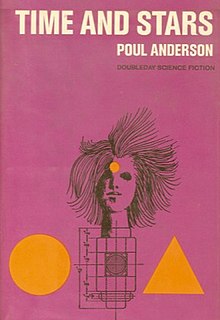
Poul William Anderson was an American fantasy and science fiction author who was active from the 1940s until his death in 2001. Anderson also wrote historical novels. He won the Hugo Award seven times and the Nebula Award three times, and was nominated many more times for awards.

Damon Francis Knight was an American science fiction author, editor, and critic. He is the author of "To Serve Man", a 1950 short story adapted for The Twilight Zone. He was married to fellow writer Kate Wilhelm.
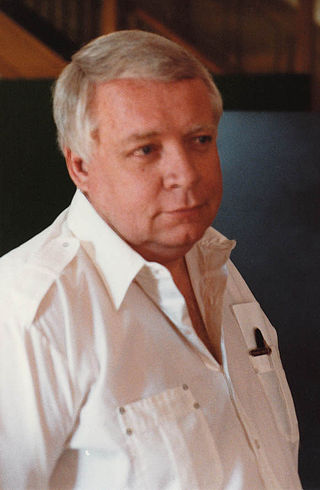
Algirdas Jonas "Algis" Budrys was a Lithuanian-American science fiction author, editor and critic. He was also known under the pen names Frank Mason, Alger Rome in collaboration with Jerome Bixby, John A. Sentry, William Scarff and Paul Janvier. In 1960 he wrote Rogue Moon, a novel. In the 1990s he was the publisher and editor of the science-fiction magazine Tomorrow Speculative Fiction.

Lester del Rey was an American science fiction author and editor. He was the author of many books in the juvenile Winston Science Fiction series, and the fantasy editor at Del Rey Books, the fantasy and science fiction imprint of Ballantine Books, subsequently Random House, working for his fourth wife Judy-Lynn del Rey’s imprint, Del Rey.
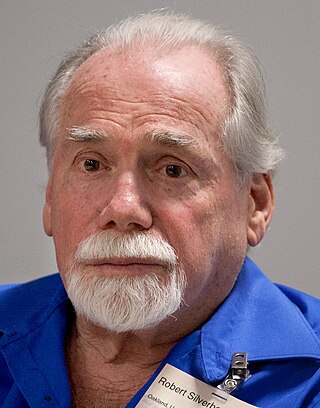
Robert Silverberg is a prolific American science fiction author and editor. He is a multiple winner of both Hugo and Nebula Awards, a member of the Science Fiction and Fantasy Hall of Fame, and a Grand Master of SF since 2004.

The Rest of the Robots is a collection of eight short stories and two full-length novels by American writer Isaac Asimov, published in 1964. The stories, centred on positronic robots, are all part of the Robot series, most of which take place in the Foundation universe. Another collection of short stories about robots, I, Robot, was re-published in the previous year, which is why Asimov chose to title the collection as The Rest of the Robots. None of the short stories in this collection were in I, Robot, however all of them were later included in The Complete Robot, and both novels about Elijah Baley were also published separately.
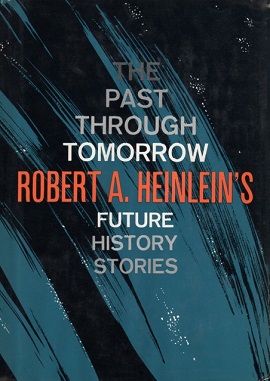
The Past Through Tomorrow is a collection of science fiction stories by American writer Robert A. Heinlein, first published in 1967, all part of his Future History.
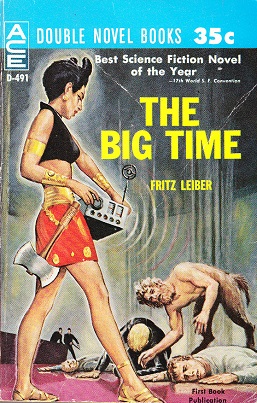
The Big Time is a short science fiction novel by American writer Fritz Leiber. Awarded the Hugo Award for Best Novel or Novelette in 1958, The Big Time was published originally in two parts in Galaxy Magazine's March and April 1958 issues, illustrated by Virgil Finlay. It was subsequently reprinted in book form several times. The Big Time is a story involving only a few characters, but with a vast, cosmic backstory.

"Marooned off Vesta" is a science fiction short story by American writer Isaac Asimov. It was the third story he wrote, and the first to be published. Written in July 1938 when Asimov was 18, it was rejected by Astounding Science Fiction in August, then accepted in October by Amazing Stories, appearing in the March 1939 issue. Asimov first included it in his 1968 story collection Asimov's Mysteries, and subsequently in the 1973 collection The Best of Isaac Asimov.
"Neutron Star" is an English language science fiction short story by American writer Larry Niven. It was originally published in the October 1966 issue of Worlds of If. It was later reprinted in the collection of the same name and Crashlander. The story is set in Niven's fictional Known Space universe. It is notable for including a neutron star before their existence was widely known.
Orbit was a series of anthologies of new science fiction edited by Damon Knight, often featuring work by such writers as Gene Wolfe, Joanna Russ, R. A. Lafferty, and Kate Wilhelm. The anthologies tended toward the avant-garde edge of science fiction, but by no means exclusively; occasionally the volumes featured nonfiction critical writing or humorous anecdotes by Knight. Inspired by Frederik Pohl's Star Science Fiction series, and in its turn an influence on other original speculative fiction anthologies, it ran for over a decade and twenty-one volumes, not including a 1975 "Best of" collection selected from the first ten volumes.
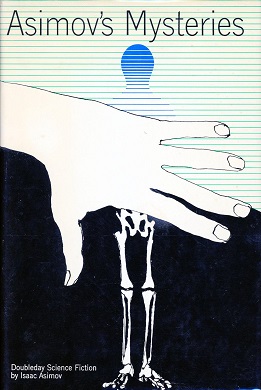
Asimov's Mysteries, published in 1968, is a collection of 14 short stories by American writer Isaac Asimov, almost all of them science fiction mysteries. The stories were all originally published in magazines between 1954 and 1967, except for "Marooned off Vesta", Asimov's first published story, which first appeared in 1939.
"The Jigsaw Man" is a science fiction short story by American writer Larry Niven, set in the Known Space universe. The story was first published in Harlan Ellison's anthology Dangerous Visions, and is included in Niven's collections All the Myriad Ways and Tales of Known Space.
"If All Men Were Brothers, Would You Let One Marry Your Sister?" is a science fiction short story by American writer Theodore Sturgeon. It first appeared in Harlan Ellison's anthology Dangerous Visions in 1967.
A fix-up is a novel created from several short fiction stories that may or may not have been initially related or previously published. The stories may be edited for consistency, and sometimes new connecting material, such as a frame story or other interstitial narration, is written for the new work. The term was coined by the science fiction writer A. E. van Vogt, who published several fix-ups of his own, including The Voyage of the Space Beagle, but the practice exists outside of science fiction. The use of the term in science fiction criticism was popularised by the first (1979) edition of The Encyclopedia of Science Fiction, edited by Peter Nicholls, which credited van Vogt with the term’s creation. The name “fix-up” comes from the changes that the author needs to make in the original texts, to make them fit together as though they were a novel. Foreshadowing of events from the later stories may be jammed into an early chapter of the fix-up, and character development may be interleaved throughout the book. Contradictions and inconsistencies between episodes are usually worked out.
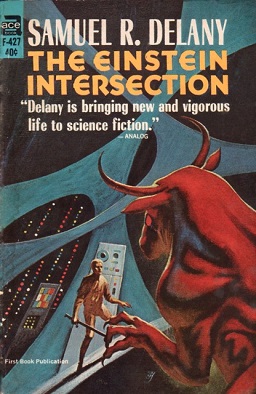
The Einstein Intersection is a 1967 science fiction novel by Samuel R. Delany. The title is a reference to Einstein's Theory of Relativity connecting to Kurt Gödel's Constructible universe, which is an analogy to science meeting philosophy. The original publisher, Ace Books, changed Delany's originally intended title from A Fabulous, Formless Darkness for commercial reasons.

The Watch Below (1966) is a science fiction novel by British writer James White about a colony of humans stranded underwater in a sunken ship, who survive by air pockets, and a water-breathing alien species in search of a new home. The two generation ships encounter each other in the Earth's ocean.
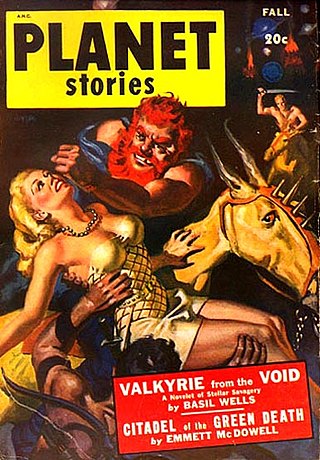
"Mars Is Heaven!" is a science fiction short story by American writer Ray Bradbury, originally published in 1948 in Planet Stories. "Mars Is Heaven!" was among the stories selected in 1970 by the Science Fiction Writers of America as one of the best science fiction short stories published before the creation of the Nebula Awards. As such, it was published in The Science Fiction Hall of Fame Volume One, 1929–1964. It also appears as the sixth chapter of The Martian Chronicles, revised as "The Third Expedition."
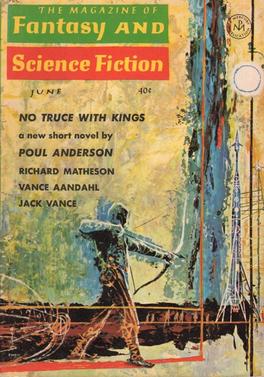
"No Truce With Kings" is a science fiction novella by American writer Poul Anderson. It won the Hugo Award for Best Short Fiction in 1964, and the Prometheus Award for Classic Fiction in 2010. The title is taken from Rudyard Kipling's poem "The Old Issue" (1899), in which kings represent tyranny or other forms of imposed rule, to be fought to preserve hard-won individual freedoms.
"Bookworm, Run!" is a science fiction short story by American writer Vernor Vinge. His second published work of fiction, it appeared in Analog Science Fiction Science Fact in 1966, and was reprinted in True Names... and Other Dangers in 1987, and in 2001's The Collected Stories of Vernor Vinge.
